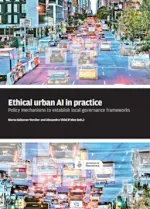About the authors

Tanya Álvarez, is a researcher for the Mobile World Capital Foundation’s Observatory. She leads research on digital inclusion and the use of automated decision-making systems in the public sector. She advocates for an interdisciplinary perspective of how technology impacts society. She has a degree in Art History from Swarthmore College and a Master’s degree in Cultural Heritage Management from the University of Barcelona.
Josuan Eguiluz Castañeira holds a degree in Law and ICT from the University of Deusto and a Dual Master’s in Access to the Legal Profession and Intellectual Property, New Technologies and Data Protection from Esade. He began his professional career as a lawyer in the Intellectual Property, New Technologies and Data Protection Department at Cuatrecasas. Currently, he serves as Legal Counsel at Adevinta. He is also a lecturer in digital law at Esade, Deusto and The Legal School, among others. He is pursuing an Industrial PhD in AI, High-Risk Areas and Fundamental Rights at Universitat Pompeu Fabra, Barcelona Supercomputing Center and Infojobs/Adevinta.
Carlos Fernández Hernández holds a degree in law and is currently a PhD candidate at Universidad Carlos III de Madrid. After practising as a lawyer for a number of years, he has devoted his professional career to the publication of legal content for professionals in the sector, always under the “La Ley” brand. Since 2013, he has specialised in the field of law and technology, initially at the legal news portal Noticias Jurídicas and, since 2016, at Diario La Ley Ciberderecho, where he has published over 1,500 articles, reports and interviews. Carlos has also been the editor of the journals Derecho Digital e Innovación and La Ley Privacidad. He has delivered specialised lectures on these subjects at various universities and postgraduate centres and contributed to several collaborative books.
Marta Galceran is a Senior Research Fellow with the Global Cities Programme at CIDOB (Barcelona Centre for International Affairs), and a part-time lecturer in international relations at Pompeu Fabra University and CEI-International Affairs. She is a political scientist, holds a PhD in International Relations from UPF and a master’s (awarded with special distinction) from the University of Warwick. Her research focuses on city diplomacy, urban alliances and global governance, particularly in the field of digital transitions and technological humanism. She has authored several policy papers, academic articles and other publications on these topics. She also leads the research at the Global Observatory of Urban Artificial Intelligence (GOUAI), within the Cities Coalition for Digital Rights. Before joining CIDOB, she held the position of Program Coordinator of the Smart City Expo World Congress and Senior Consultant at Anteverti, where she advised local governments and international organisations (i.e. UN-Habitat, IADB, the European Commission) on internationalisation and urban innovation policies.
Shazade Jameson is a Senior Digital Governance Consultant for public interest organisations. She specialises in urban public administrations. As a social science researcher, she shifts perspectives on digital policy and builds bridges for effective implementation. She was lead co-author of the UN-Habitat and Mila Quebec AI Institute report “AI and Cities: Risks, Applications and Governance”. She is also a PhD candidate analysing technology policy in Singapore, as part of the Global Data Justice project funded by the European Research Council at the Tilburg Institute of Law, Technology, and Society. She has collaborated with CIDOB on policy research for the Global Observatory of Urban Artificial Intelligence and works with the ITU United for Smart Sustainable Cities initiative, under the Digital Transformation for People Centered Cities thematic. Since 2024, she has been working with the UNESCO Ethics of AI Unit, facilitating the design and implementation of ethical artificial intelligence in public administrations.
Leandry Junior Jieutsa is an urban innovation consultant and researcher on AI governance in cities. His career has been a journey through diverse roles in urban planning and development, underscored by his passion for integrating technologies into urban planning. He works as an independent consultant on urban innovation and digital governance. Leandry is also the founder of the Africa Innovation Network, a think tank dedicated to urban issues. He is currently enriching his knowledge as a PhD student at the UNESCO Chair in Urban Landscape of the University of Montreal, focusing on artificial intelligence governance in cities. His research investigates the impact of AI governance on people’s well-being in cities. Through his research, he aims to support cities in building more people-centred smart cities through responsible AI governance.
Maria Pérez-Ortiz is Associate Professor at the AI Centre and Department of Computer Science at University College London (UK). She also acts as Senior Research Fellow at the Foreign, Commonwealth and Development Office of the UK government, providing advice on AI investments for international development. In 2022, she co-founded the first MSc programme on AI for Sustainable Development, at the intersection of emerging AI technologies, sustainability and ethics. Pérez-Ortiz is also deputy of the UNESCO Chair in AI. Her latest policy report “Challenging systematic prejudices: an investigation into bias against women and girls in large language models” shows the extent to which language models show gender biases. Her current line of work is responsible AI and how these novel technologies could support policymakers in complex scenarios such as climate change.
Alexandra Vidal D’oleo is a researcher and project manager for CIDOB’s Global Cities Programme at CIDOB (Barcelona Centre for International Affairs). Her research revolves around the digitisation of cities and the democratic and ethical processes in the development of urban artificial intelligence. Currently, she is part of the research team of the Global Observatory of Urban Artificial Intelligence (GOUAI) within the framework of the Cities Coalition for Digital Rights. She has a postgraduate degree in Territorial Planning with a focus on sustainable urbanism from the Universitat Politècnica de Catalunya and a degree in International Relations from Blanquerna - Universitat Ramón Llull, having completed part of her studies at L'École de Gouvernance et d'Économie in Rabat. Before joining CIDOB, she was a researcher and project manager at the Tanja Foundation, developing international cooperation projects between Morocco and Spain.